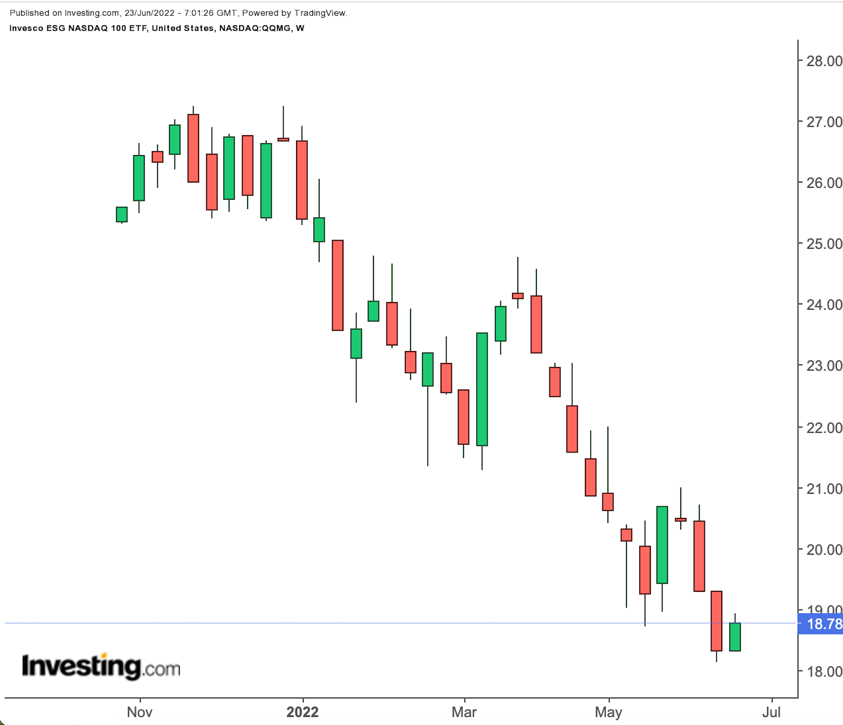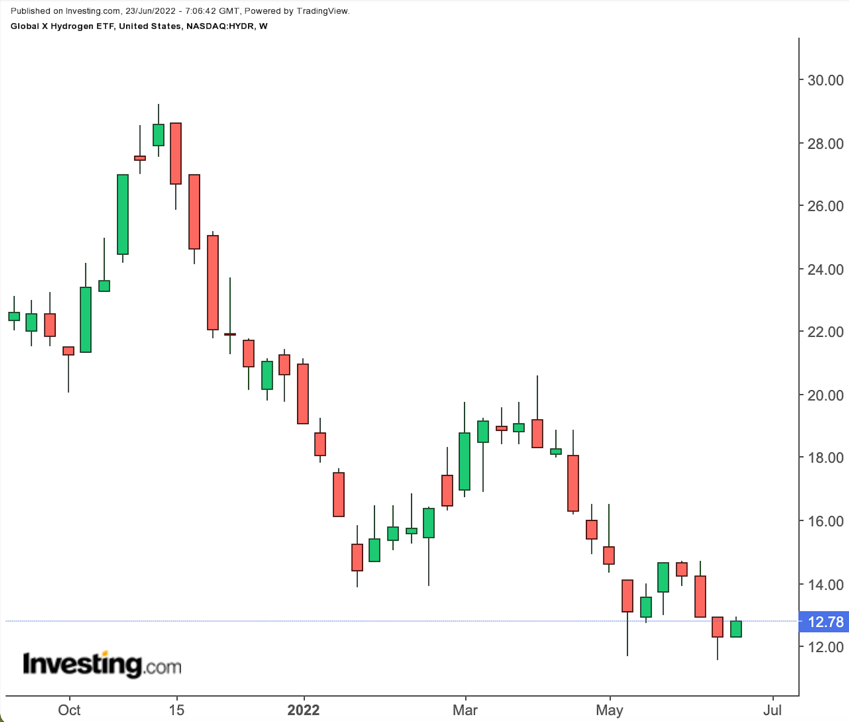Environmental, social, and governance (ESG) values have been fundamental tailwinds for many companies and sectors over the past few years. Meanwhile, innovative clean technology (cleantech) businesses fared exceptionally well during the pandemic years.
Recent research points out:
"The global green technology and sustainability market is projected to grow from $13.76 billion in 2022 to $51.09 billion by 2029, at a compound annual growth rate (CAGR) of 20.6%."
The net-zero transition of the global economy could require an investment of more than $100 trillion over the next three decades. However, despite this investment theme's popularity, stocks regarded as ESG names have also come under significant pressure in 2022.
For example, the S&P Kensho Cleantech Index has dropped around 23% since January. Meanwhile, the S&P 500 index has lost more than 21% over the same period.
Today, we examine two thematic exchange-traded funds (ETFs). Although each fund is likely to have different criteria, in general, ESG benchmarks typically avoid companies whose activities involve tobacco, alcohol, gambling, cannabis, and fossil fuels.
1. Invesco ESG NASDAQ 100 ETF
- Current Price: $18.78
- 52-week range: $18.01 -$27.24
- Dividend yield: 0.78%
- Expense ratio: 0.20% per year
The first fund on today's list is the Invesco ESG NASDAQ 100 ETF (NASDAQ:QQMG). It could appeal to those wishing to invest in NASDAQ 100 Index members that meet ESG criteria.
QQMG, which tracks the NASDAQ 100 ESG Index, currently has 96 holdings. The fund was first listed in October 2021, and net assets stand at $9.4 million. Thus, QQMG is a relatively new and small fund. Therefore, further due diligence would be necessary before buying into the fund.
In terms of sectoral allocation, we see information technology (61.12%), communication services (14.14%), consumer discretionary (10.53%), consumer staples (6.18%), healthcare (5.86%), and industrials (2.17%).
About half of the portfolio is held in the leading 10 names. Among them are Microsoft (NASDAQ:MSFT), Apple (NASDAQ:AAPL), NVIDIA (NASDAQ:NVDA), Alphabet (NASDAQ:GOOGL), Amazon (NASDAQ:AMZN) and PepsiCo (NASDAQ:PEP).
QQMG is down almost 30% year-to-date (YTD). Wall Street is getting ready to analyze Q2 financial results, which could determine the next move in many of these companies.
Although more downside in many Nasdaq shares is possible, we are optimistic for the earnings season. Therefore, readers wishing to invest in Nasdaq 100 shares that meet numerous ESG criteria could consider researching the fund further.
2. Global X Hydrogen ETF
- Current Price: $12.78
- 52-week range: $11.41 - $29.23
- Expense ratio: 0.50% per year
We next focus on companies that are part of the hydrogen economy, which relies on hydrogen as a low-carbon and clean energy resource. The global green hydrogen market could approach $6 billion by the end of the decade. Such an expansion would mean a compound annual growth rate (CAGR) of well over 17% from current levels.
As a result, technology that focuses on hydrogen fuel cells, such as fuel cell electric vehicles (EVs), is gaining traction. However, research reminds us:
"Like any other product, hydrogen must be packaged, transported, stored, and transferred to bring it from production to final use."
Our next fund may appeal to readers who expect hydrogen to be adopted in many industries globally and contribute to the clean energy transition in the coming years. The Global X Hydrogen ETF (NASDAQ:HYDR) gives access to businesses at the center of the hydrogen sector.
HYDR, which was first listed in July 2021, holds 25 stocks. Net assets stand at $28.6 million.
Close to 40% of the companies are based in the US. Next, we see names from the UK, Norway, Canada, Sweden, South Korea, Germany, France, and Japan.
Around three-quarters of the portfolio is held in the leading 10 stocks. Fuel cell maker Bloom Energy (NYSE:BE); Norway-based dedicated hydrogen group Nel ASA (OL:NEL); Plug Power (NASDAQ:PLUG) known for its turnkey solutions in the hydrogen space; Canadian Ballard Power Systems (TSX:BLDP), which focuses on proton exchange membrane (PEM) fuel cell products; and Germany-based SFC Energy (F:F3CG), which focuses on the direct methanol fuel cell (DMFC) technology.
HYDR has lost 38.2% of its value since the start of the year. Investors interested in the nascent green energy segment may want to keep the ETF on their watchlist.
